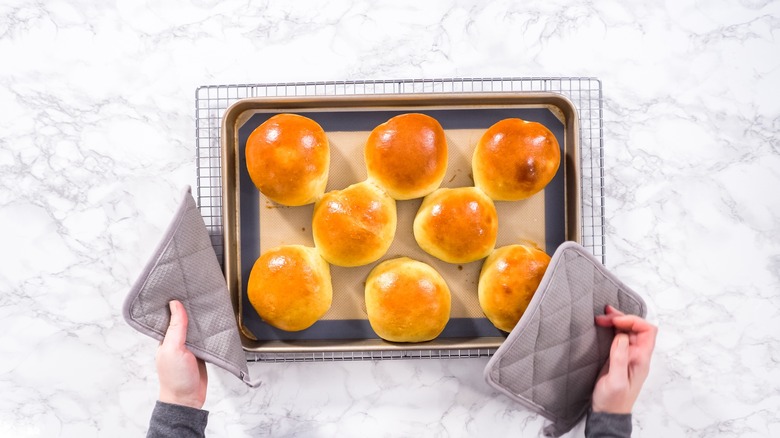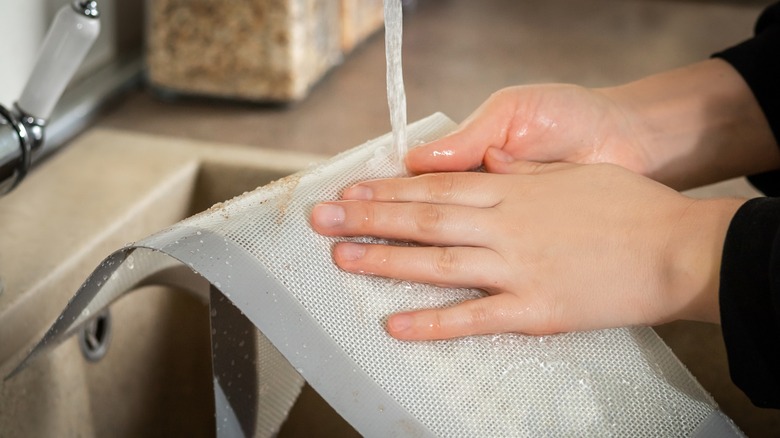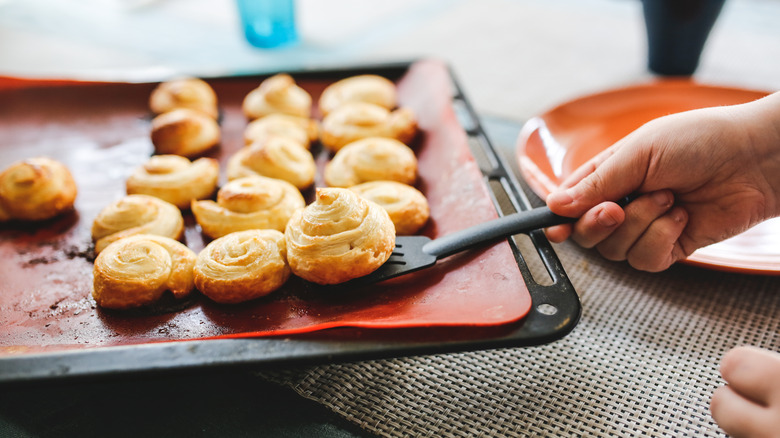The Mistake That Makes Cleaning Silicone Baking Mats Much Harder
We may receive a commission on purchases made from links.
Silicone baking mats are an incredible tool to introduce to your kitchen if you've yet to try one. Forget the cooking spray, greasy Crisco, or parchment paper and invest in one of these fantastic non-stick mats. Not only will they help you reduce waste by cutting out traditional non-stick products and sprays, but they also help cook your food more efficiently by providing even heat distribution, leading to more consistent bakes and preventing burnt or unevenly cooked food. These mats are durable and reusable, making them a great way to help upgrade your kitchen to a more sustainable space. Lastly, they're super versatile and work well for roasting veggies, baking cookies, or roasting meat. So you're probably thinking: what's the catch? Well, there is one. They can be difficult to clean, and you may even be cleaning them incorrectly by waiting until they're cool.
Though silicone mats add a range of benefits to your culinary endeavors, they are a bit of a pain to keep clean. Letting them cool first seems like a logical practice to prevent burns, but it actually allows food residues and oils to harden on the surface, making cleaning less effective unless you do it right away. This practice can be inconvenient, as it also requires you to remove the food from the tray more quickly so you can pop the hot mat right into the sink, but, nevertheless, doing so will provide a more sanitary result and increase the longevity of the silicone mat.
How to clean your silicone baking mats
To properly clean your silicone baking mats to maintain their longevity and effectiveness, it's important to clean them immediately after they come out of the oven. Carefully remove the food from the surface of the pan and place it on a heat-resistant surface or platter. Then, wearing heat resistant gloves, put the silicone mat in the sink and clean it with a mild dish soap and a sponge to wipe off any food particles debris. It's recommended to use a non-abrasive soap and sponge so that you don't tear or damage the silicone, too, ensuring it will last through thousands of uses in your kitchen. Rinse it in cool water, and once you're satisfied that you have successfully cleaned it, you can dry it with a gentle cloth and store it until its next use.
If you've made the dreaded mistake of letting your silicone mat cool before you had a chance to wash it properly, you can still salvage it. One option is to simply warm it back up by placing it in the oven, allowing the silicone to expand and release any oils that may have dried or seeped into the crevices. Once you've heated it back up in the oven, you can proceed to clean it with the mild soap and water, or for really tough stains, soak it in a bath of very hot soapy water for about 30 minutes and then continue with gently sponge-cleaning it.
Cautions for cleaning silicone mats
Cleaning your silicone baking mats properly is an important step in maintaining their hygiene and making sure that they last for years to come. Since the best time to clean them is when they're fresh out of the oven, it's important to exercise caution when handling them. Never use bare hands to remove a mat from a baking sheet, as the mats and pan will be extremely hot and can easily burn you. Instead, wear a pair of heavy-duty heat-resistant gloves to protect your hands when transferring them from the baking sheet to the sink. Even when they're in the sink and under running water, it's important to wear these gloves, especially because the silicone can release hot oils when it expands. Amazon sells a waterproof pair for $15.99 that are perfect for this process as they won't be damaged if you submerge your hands in water while you clean.
While your own protection is important, it's also crucial to properly handle the mats so you can avoid unintentionally damaging them. When cleaning silicone, it's essential to only use mild detergents and soft sponges, because scouring pads or stainless steel scrubbers will damage the surface of the silicone. Additionally, while many mats claim that they are dishwasher safe, they will last much longer if you hand wash them instead. Some dishwasher detergents may be too strong for the silicone, not to mention that the oils may not release if the dishwasher temperature isn't high enough.


